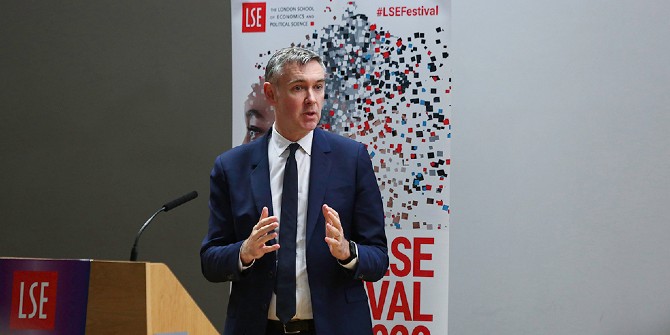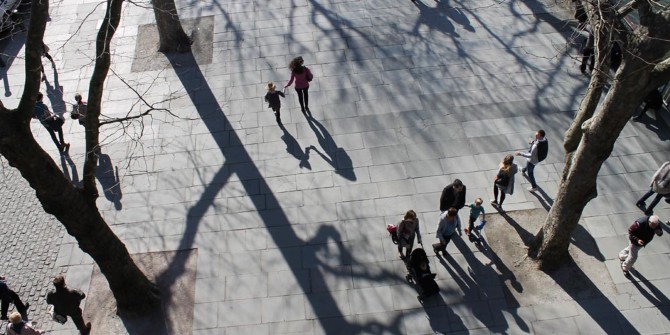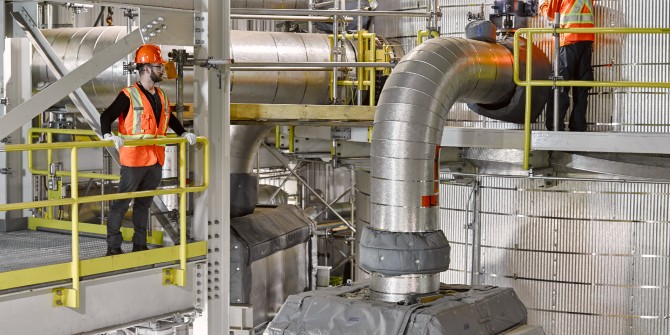What will the ‘new normal’ be? Despite the blow COVID-19 has inflicted, we now have a unique opportunity to re-evaluate many aspects of modern economy, society, and government. Simon Hix (Pro-Director for Research, LSE) explains how the LSE’s new initiative can help shape the post-COVID world.
“The world will never be the same after COVID-19”. Is that true? Previous social and economic crises have shown that many things do return to normal (sometimes worse than that), and surprisingly fast. We have short memories and we do not learn from our recent experiences as much as we think we will; so existing structures can be hard to change. And people are desperate for many aspects of life to return to ‘normal’: for a rebooted economy, jobs to be recreated, revived social and human relations, familiar work-life patterns, and so on.

The debate about where the world is heading post-COVID is also plagued by confirmation bias. People who love capitalism expect ‘creative destruction’ of old industries and unproductive firms to generate new economic opportunities. People who critique it look forward to a larger role for the state in the economy. Democrats expect authoritarian regimes to be undermined for failing to protect their citizens. Authoritarians expect democracies to show themselves incapable of effective action.
In spite of all these potential pitfalls, the crisis provides a unique opportunity to re-evaluate many aspects of modern economy, society, and government. If we return to the “old normal”, the opportunity to craft a new economy, a new society, and new governance systems will have been missed. The creation of a ‘new normal’ requires new systems and processes and new ways of analysing data. If they are put in place now they are more likely to ‘stick’ afterwards.
Starting this autumn and leading up to next year’s LSE Festival, the Shaping the Post-COVID World initiative will build on the important conversations and research being undertaken as part of the LSE’s COVID-19 response. It will convene debate about the direction the world could and should be taking after the COVID-19 crisis, and what policies national and global actors should pursue. We have an opportunity to help shape the “new normal” in line with our strategic ambition to be the leading social science institution with the greatest global impact.
We will be exploring several key themes:
The macro economy
The challenges of post-pandemic economic reconstruction will dwarf anything the world has seen since the Depression. Despite unparalleled levels of government support for businesses around the world, it is likely that tens of millions of people will have lost their jobs and uncounted firms will have been pushed into bankruptcy, destroying valuable productive capital. In the advanced countries, public debt will often exceed the value of annual GDP. Developing countries will be reeling from the combined effects of the virus, lower commodity prices, blocked supply chains, lost income from tourism and remittances, and massive capital outflows. What policies will restore growth and employment in this scorched-earth scenario? How can debt be managed in the long term, taking into consideration trade-offs like retirement age, pension funds and taxation?
Restructuring business, trade and the future of work
The radical shock to business comes on top of a series of shifts brought about by the fourth industrial revolution, as increased use of data, technology and AI creates new opportunities and challenges for business, society and governments. This crisis is sure to accelerate these changes — not least in our working practices, as some people discover that what they did in the office they can also do, and perhaps more productively, from home. But the pandemic has also brought home the risks of the ‘gig economy’, in which people work without a formal contract and guaranteed benefits. The crisis has revealed the fragility of ‘just in time’ global supply chains, and is highlighting the strengths of a ‘just in case’ model of resilience and local sourcing. This is all happening as geopolitical tensions grow, posing their own threats to international trade. How will — and should — governments, businesses and labour respond? Has trade globalisation reached its zenith? Does the crisis pose a challenge to models of liberal capitalism and profit maximisation, or underscore the need for them?
Inequality and social infrastructure
The crisis will reinforce existing inequalities and bring forth new ones: between the elderly who could not go outside and the young who were kept inside by government decree; between professionals who could work from home and factory workers who could not; between furloughed formal workers and the self-employed who lost all income; between citizens in rich countries whose governments could borrow their way out of the crisis, and the those in poor countries which did not have the resources to fight the pandemic. Progressives will expect greater wealth redistribution, as we saw after the Great Depression and WWII, but high debt and collapsing government revenues will make that difficult. The crisis has also revealed the importance of social infrastructure, as networks of volunteers and communities have supported those in need. Collaborations have developed virtually and physically among the public, private, charitable and civic sectors. Exploring how we can strengthen our social infrastructure will be as important as fostering economic growth in building the post-COVID world.
Health and social care
The crisis has revealed how inadequate some health care systems are, even within the developed world. Countries that are used to being labelled ‘developing’ are watching askance as economies like the US, the UK and Italy struggle to contain the pandemic. We see how much a nation’s economy depends on the capacity and resilience of its health and social care systems, the dedication and skill of those who work in them,, and the reach of the global supply chains for medicines and equipment. The urgent collective need to develop testing and vaccines is prompting unprecedented collaborations among pharmaceutical companies, universities and governments. How should health and social care systems change as a result of the pandemic?
Environment and climate change
The pandemic has reminded us of the limits of our power over nature, and of the potentially lethal collective effects of misguided individual actions. Emissions fell rapidly in lockdown and fauna returned to places it had been forced to abandon. The economic shock of suspending most manufacturing and transport across the globe is also giving us a sense of what a ‘disorderly transition’ to net zero would entail. This will naturally prompt calls for more aggressive action in the climate crisis, with environmentalists hoping a new green economy will emerge. Yet governments will also be under great political pressure to rebuild economies and incomes, and a ‘dash for growth’ after the crisis could mean that climate change is ignored or relegated to the second tier of priorities, while businesses, investors and consumers may be reluctant to take on the costs of transition. How can we resolve these tensions?
Welfare and public policy trade-offs
The pandemic has highlighted how difficult it is to judge the wider welfare effects of responding to a major crisis. Strategies used to manage public health risks themselves pose risks: to those whose healthcare needs cannot be met due to the diversion of resources, to the economy, to the potential victims of domestic violence, to the education and welfare of children, to name only a few. These impacts are unequally distributed across countries and among groups within societies. How should policy makers and businesses make and evaluate decisions which involve trading off competing priorities, which cannot rely on simple assumptions of rational behaviour in anticipating how people and societies will respond, and in which all our behavioural biases will come to bear in deciding what to do, what data to use and whom to trust? How can we ensure that the tools we use to quantify (and ideally monetise) the full range of costs and benefits of an intervention, are appropriate? What is the role for technocratic experts in making those assessments, and to what extent should we rely on political processes to guide decision-making?
Governance and state capacity
Countries where governments are both capable and legitimate in the eyes of their citizens have enjoyed a huge advantage in crafting the policy response. The reminder that even in advanced nations citizens remain exposed to unforeseen shocks will strengthen the demand for social insurance. At the same time, in many countries the erratic response to the virus will have further undermined the trust placed in government and the ability of the state to deliver greater social protection. People may turn to local governments, cities, communities, charities, or the private sector to provide it instead. Meanwhile, the pandemic challenge requires a coordinated solution, but most policy responses so far have been national. Even the WHO remains underfunded, while attempts to mobilise large-scale resources to help poor countries fight the virus have met with limited success. Post COVID-19, citizens need better governance, both nationally and internationally. But this is happening at a time when trust in governments is challenged and when countries are turning away from existing systems of international governance.
Democracy and rights
The virus unleashed what The Economist called a “pandemic of power grabs”, as would-be autocrats take advantage of the emergency to limit rights and grant themselves enhanced powers. The attack by authoritarian populists against the institution of liberal democracy has become even more formidable, while autocrats who manipulate or hide death counts remind the world why democracy and press freedom are so important — and how crucial they are to ensuring a responsive government. Will democracy or autocracy emerge the winner from the pandemic? As governments, corporates and individuals look to develop ways to control exposure to COVID-19 through the collective use of private data (e.g. to enable contact tracing or the need to prove that one is virus-free), will the balance between individual privacy and the needs of the state and others to access and use private data be fundamentally reset? What does an online election campaign look like, can e-voting be secure, and could these mechanisms reinvigorate democracy, particularly amongst younger generations?
We hope you will join us for virtual discussions of these themes and engage with the arguments on the LSE COVID-19 blog and other online publications.
This post represents the views of the author.





